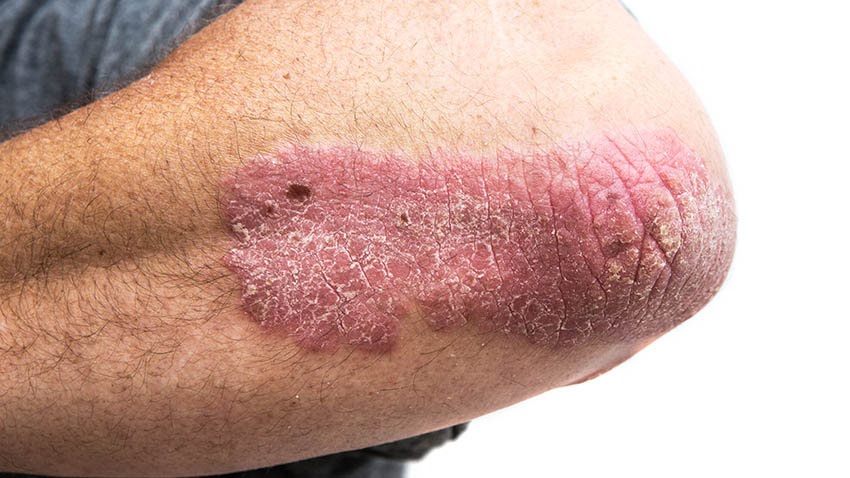
With 125 million sufferers worldwide, we look at the best ways to ease and treat psoriasis at home.
Psoriasis is a non-contagious autoimmune skin condition that results in patches of red, scaly and flaky skin that can be itchy and sore. It can appear anywhere on the body, but most commonly affects the elbows, scalp, knees and back. The condition can also affect fingernails and toenails.
Psoriasis occurs because the immune system over-responds, which causes the skin cells (B-cells and T-cells) to reproduce much faster than normal leaving a build-up of skin layers.
Whilst there isn’t a cure (yet), there are ways to treat the condition topically, on the surface of the skin, and internally by helping the immune system. Many of these can be easily done at home.
Here are 12 ways you can treat your psoriasis in the privacy and comfort of your own home.
Hydrocortisone cream is one product of many in the corticosteroid family. It is ideal for treating mild to moderate cases of psoriasis and works by reducing redness, itching and swelling when applied to the skin.
Light therapy, also known as phototherapy, is the use of ultraviolet light (UV light) to decrease the immune response in the skin. As a natural therapy, it suits people who don’t like topical ointments and creams, chemicals or injections. Traditionally carried out under doctor supervision, it is now possible to use a handheld phototherapy device at home.
Vitamin D, which the body produces when exposed to sunlight, can help to slow the skin growth when taken in supplemental form or applied directly to the skin via prescription medication. Too much vitamin D can be dangerous, however, so consult your GP before taking. You can check your Vitamin D levels here: Vitamin D Test Kit
Retinoid is a synthetic form of vitamin A and can help to speed up the shedding of skin cells when applied as a cream or gel. Consequently, it can reduce the thickness and scale of psoriasis. It isn’t for everyone, though, and can come with side effects like skin sensitivity to the sun. Always consult your GP or dermatologist before applying.
Salicylic acid is a beta hydroxy acid (BHA) frequently used in skincare products and acne treatments. It works as a peeling agent, which then allows other treatments to work more effectively.
Coal tar, as the name suggests, is derived from coal and has been used to treat psoriasis for over one hundred years. It is a thick oil and, when topically applied, helps to shed the top layer of skin and scales to reveal smoother skin underneath.
Steroid creams reduce inflammation (puffiness) and itching caused by mild to moderate psoriasis. Whilst steroids are commonly used, long-term use is not recommended.
Turmeric (curcumin) is a spice frequently used in Chinese medicine to reduce inflammation and relieve common symptoms of psoriasis. It also contains antioxidant, antimicrobial and anti-carcinogenic properties, and can be taken orally or applied topically.
Aloe extract is the gel from the aloe plant leaves that offers sufferers a natural remedy that has been used since ancient times. Research shows it can help to soothe the skin and stop it from drying out.
Omega 3 oil supplements (derived from fish, oils, nuts and vegetables) can reduce inflammation and irritation by lubricating the cells when taken orally as supplements or from food sources.
Oatmeal baths or Epsom Salt baths help to soothe the skin and reduce itching. After your bath, don’t forget to moisturise with a non-irritating cream.
Lifestyle improvements can lessen the effects of psoriasis. Studies have found that alcohol, stress and smoking can worsen symptoms. By eating a balanced diet, increasing exercise, reducing stimulants, and taking time to relax and breathe, you will not only help the severity of the condition but will also feel better in yourself.
It’s important to remember you are not alone if you suffer from psoriasis. This uncomfortable skin condition affects 4% of the world’s population.
If you feel depressed or anxious about your skin, please don’t suffer in silence. Others have been where you are now and have found ways to improve the quality of their life and wellbeing. Speak to your GP if you are worried or visit the Psoriasis and Psoriatic Arthritis Alliance to find out more.
Read more about Psoriasis in our Health Information pages.